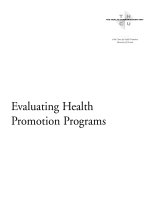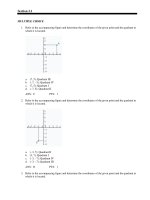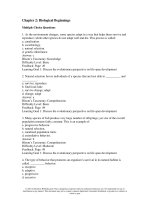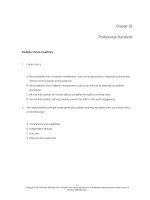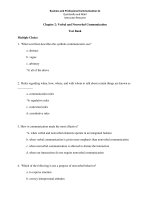Planning implementing and evaluating health promotion programs a primer 6th edition mckenzie test bank
Bạn đang xem bản rút gọn của tài liệu. Xem và tải ngay bản đầy đủ của tài liệu tại đây (546.12 KB, 11 trang )
INSTRUCTOR’S MANUAL AND
TEST BANK
Bridget Melton
GEORGIA SOUTHERN UNIVERSITY
Planning, Implementing,
and Evaluating Health
Promotion Programs
A Primer
SIXTH EDITION
James F. McKenzie
Brad L. Neiger
Rosemary Thackeray
Boston Columbus Indianapolis New York San Francisco Upper Saddle River
Amsterdam Cape Town Dubai London Madrid Milan Munich Paris Montréal Toronto
Delhi Mexico City São Paulo Sydney Hong Kong Seoul Singapore Taipei Tokyo
Executive Editor: Sandra Lindelof
Project Editor: Meghan Zolnay
Editorial Assistant: Briana Verdugo
Managing Editor: Deborah Cogan
Production Project Manager: Dorothy Cox
Production Management and Composition: Anju Joshi, PreMediaGlobal
Executive Marketing Manager: Neena Bali
Credits and acknowledgments borrowed from other sources and reproduced, with permission, in this textbook appear on the
appropriate page within the text.
Copyright © 2013, 2009, 2005 Pearson Education, Inc. All rights reserved. Manufactured in the United States of America. This
publication is protected by Copyright, and permission should be obtained from the publisher prior to any prohibited reproduction,
storage in a retrieval system, or transmission in any form or by any means, electronic, mechanical, photocopying, recording, or
likewise. To obtain permission(s) to use material from this work, please submit a written request to Pearson Education, Inc.,
Permissions Department, 1900 E. Lake Ave., Glenview, IL 60025. For information regarding permissions, call (847) 486-2635.
Many of the designations used by manufacturers and sellers to distinguish their products are claimed as trademarks. Where those
designations appear in this book, and the publisher was aware of a trademark claim, the designations have been printed in initial caps
or all caps.
www.pearsonhighered.com
ISBN 10: 0-321-80857-6
ISBN 13: 978-0-321-80857-8
Contents
Introduction
1
Chapter 1
Health Education, Health Promotion, Health Educators, and Program Planning
2
Chapter 2
Starting the Planning Process
4
Chapter 3
Models for Program Planning in Health Promotion
8
Chapter 4
Assessing Needs
10
Chapter 5
Measurement, Measures, Measurement Instruments, and Sampling
12
Chapter 6
Mission Statement, Goals, and Objectives
14
Chapter 7
Theories and Models Commonly Used for Health Promotion Interventions
16
Chapter 8
Interventions
18
Chapter 9
Community Organizing and Community Building
19
Chapter 10 Identification and Allocation of Resources
20
Chapter 11 Marketing
21
Chapter 12 Implementation
23
Chapter 13 Evaluation: An Overview
24
Chapter 14 Evaluation Approaches and Designs
26
Chapter 15 Data Analysis and Reporting
28
Suggested Rubrics for Evaluation Reports
30
iii
Copyright © 2013 Pearson Education, Inc.
Contents
Test Bank
Chapter 1
Health Education, Health Promotion, Health Education Specialists, and Program Planning
36
Chapter 2
Starting the Planning Process
42
Chapter 3
Models for Program Planning in Health Promotion
46
Chapter 4
Assessing Needs
51
Chapter 5
Measurement, Measures, Measurement Instruments, and Sampling
56
Chapter 6
Mission Statement, Goals, and Objectives
61
Chapter 7
Theories and Models Commonly Used for Health Promotion Interventions
65
Chapter 8
Interventions
70
Chapter 9
Community Organizing and Community Building
76
Chapter 10 Identification and Allocation of Resources
80
Chapter 11 Marketing
85
Chapter 12 Implementation
90
Chapter 13 Evaluation: An Overview
94
Chapter 14 Evaluation Approaches and Designs
98
Chapter 15 Data Analysis and Reporting
Copyright © 2013 Pearson Education, Inc.
102
Introduction
This Instructor Manual for Planning, Implementing, and Evaluating Health Promotion Programs, 6th ed.
was developed to make teaching a health promotions class easier. An extended assignment, with an
accompanying grading rubric, has been created for each chapter. Each assignment will assist students to
plan, implement, and evaluate a health promotion program. The assignment can be used to accompany the
chapters in the textbook or as a larger project. This Instructor Manual also includes grading rubrics for each
component of a final evaluation report.
1
Copyright © 2013 Pearson Education, Inc.
CHAPTER
1
Health Education, Health Promotion,
Health Education Specialists, and
Program Planning
EXTENDED ASSIGNMENT
Personal Health Interest Reflection
Health Education and Promotion typically come from professionals (i.e., Health Education Specialists) who
are passionate about what they do and the potential impact they could make on someone’s life. During this
course, you will be asked to select a health topic and plan a program for it. But before you begin this
journey, you need to describe what you are passionate about.
Please write a brief 1- to 2-page summary of 1-3 health topics you find interesting and why. Also, tell the
reader what you hope to achieve in this course and how it might help you in the future. This reflection paper will
be the only paper that you will write in first person and for which source notes are optional and not required.
GRADING RUBRIC
Objectives/Criteria
Topic
Personal Connection
Performance Indicators
Needs Improvement
Meets Expectations
Exceptional
(5 points)
(.75 point)
(1 point)
It was not clear whether the Presented 1 to 3 topics
student found her/his topic of interest.
interesting.
Clearly and concisely
presented 1 to 3 topics of
interest.
(2 points)
Missed the connection
between the importance of
the topics and why the
student is interested in the
topic.
(4 points)
A clear description of why
each topic is of personal
interest to the student; the
writing demonstrated a
thorough personal exam of
the student’s convictions.
(3 points)
A description of why the
topic was important, but
little evidence of why
the student feels
passionately about the
topic.
(Continued)
2
Copyright © 2013 Pearson Education, Inc.
GRADING RUBRIC
Objectives/Criteria
Performance Indicators
Needs Improvement
Meets Expectations
Exceptional
Future Goals
(1.5 points)
Goals unrealistic or not
related to the course.
(2.5 points)
Missing immediate or
future goal.
(3 points)
An insight to what the
student hopes to learn or
gain from investigating the
topic, and how that may
help the student in the
future.
Audience Awareness
(1 point)
More than 4 errors in
grammar and spelling.
(1.5 points)
1 to 3 errors in spelling
and grammar.
(2 points)
No errors in grammar or
spelling.
Out of 10 points:
CHAPTER 1 HEALTH EDUCATION, HEALTH PROMOTION, HEALTH EDUCATORS, AND PROGRAM PLANNING
Copyright © 2013 Pearson Education, Inc.
3
CHAPTER
2
Starting the Planning Process
EXTENDED ASSIGNMENT
Annotated Bibliography
Please choose a health topic that interests you and that you might operate as a health promotional program in the
future or as part of this class. Using the Internet, find sources and review the current literature on this topic. Find
25 sources that are relevant to your topic⎯the majority (20 sources) should be from peer-reviewed journals.
Some guiding questions to help your Internet search:
•
•
•
•
•
•
•
How significant is this health condition?
What causes this condition?
What is this health condition linked to (genetic, behavior or environment)?
Who is more affected by this health issue?
What is currently being done to address this condition nationally, statewide, and locally?
What health education programs are being done with the health condition topic?
What innovative ways are researchers addressing your health issues?
The annotated bibliography should be prepared using APA (American Psychological Association) format
and include a brief summary paragraph about each source below its entry, as shown in the examples below.
Example Annotated Bibliography Entries
Adams, T., Moore, M., & Dye, J. (2007). The relationship between physical activity and mental health
in a national sample of college females. Women & Health, 45(1), 69-85. Retrieved from EBSCOhost.
• This study analyzed the effects of physical activity on the mental health of college females. 22,073
females participated where depression, anxiety, suicidal ideation, and perceived health were the defendant
variables and two bouts of weekly exercise were the independent variables. Exercise was shown to
endorse a positive perceived health and alleviate feelings of depression. This article is important because
depression and self-esteem issues in college-aged females is a prevalent issue and needs more attention.
This population is sometimes forgotten about and the mental health of these students is very important.
Justine, M., & Hamid, T. (2010). A multicomponent exercise program for institutionalized older
adults: effects on depression and quality of life. Journal of Gerontological Nursing, 36(10), 32-41. doi:
10.3928/00989134-20100330-09
• This study is different because it used exercise as a treatment for depression in institutionalized
older adults. The study took place in a shelter home in Malaysia where 23 volunteers over the age of
60 performed 60 minutes of exercise three times a week for 12 weeks. The control was 20 sedentary
older adults. At the end of 12 weeks, the physically active older adults reported an improvement in
quality of life. This study is also important to include because it examines the relationship between
exercise and depression in a country other than the United States.
4
Copyright © 2013 Pearson Education, Inc.
GRADING RUBRIC
Objectives/Criteria
Performance Indicators
Needs Improvement
Meets Expectations
Exceptional
Quantity of Work
(1 point)
Less than 19 sources used
or more than 5 non-peerreviewed journals used.
(1.5 points)
20–24 appropriate sources
with less than 5 non-peerreviewed sources.
(2 points)
At least 25 appropriate
sources were used with less
than 5 non-peer reviewed.
Currency
The timeliness of the
information.
(1 point)
Less than 50% of the
sources had currency
described.
(1.5 points)
Inconsistently answered
the following questions
about the currency of
each source.
(2 points)
Able to consistently answer
the following questions
about the currency of each
source:
• When was the
information published
or posted?
• Has the information been
revised or updated?
• Is the information
current or out-of-date
for the topic?
• Is the source URL
functional?
Relevance
The importance of the
information for your
needs.
(1 point)
Less than 50% of the
sources had the relevance
described.
(1.5 points)
Inconsistently answered
the following questions
about the relevance of
each source.
(2 points)
Able to consistently answer
the following questions
about the relevance of
each source:
• Does the information
relate to your topic or
answer your question?
• Who is the intended
audience?
• Is the information at an
appropriate level (i.e.,
not too elementary or
advanced for your
needs)?
• Have you looked at a
variety of sources before
determining this is one
you will use?
• Would you consider
using this source for a
research paper?
(Continued)
CHAPTER 2 STARTING THE PLANNING PROCESS
Copyright © 2013 Pearson Education, Inc.
5
GRADING RUBRIC
Objectives/Criteria
Performance Indicators
Needs Improvement
Meets Expectations
Exceptional
Authority
The source of the
information.
(1 point)
Less than 50% of the
sources had the authority
described.
(1.5 points)
Inconsistently answered
the following questions
about the authority of
each source.
(2 points)
Able to consistently answer the
following questions about the
authority of each source:
• Who is the author/
publisher/source/sponsor?
• Are the author’s credentials
or organizational affiliations
given?
• What are the author’s
qualifications to write on the
topic?
• Is there contact information,
such as a publisher or email
address?
• Does the source URL reveal
anything about the author or
source (e.g., .com .edu .gov
.org .net)?
Accuracy
The reliability,
truthfulness, and
correctness of the
informational
content.
(1 point)
Less than 50% of the
sources had the accuracy
described.
(1.5 points)
Inconsistently answered
the following questions
about the accuracy of
each source.
(2 points)
Able to consistently answer the
following questions about the
accuracy of each source:
• Where does the information
come from?
• Is the information supported
by evidence?
• Has the information been
reviewed or refereed?
• Can you verify any of the
information in another
source or from personal
knowledge?
• Does the language or tone
seem biased and free of
emotion?
• Are there spelling, grammar,
or other typographical
errors?
(Continued)
6
INSTRUCTOR MANUAL FOR PLANNING, IMPLEMENTING, AND EVALUATING HEALTH PROMOTION PROGRAMS
Copyright © 2013 Pearson Education, Inc.
GRADING RUBRIC
Objectives/Criteria
Performance Indicators
Needs Improvement
Meets Expectations
Exceptional
Purpose
The reason the
information exists.
(1 point)
Less than 50% of the
sources had the purpose
described.
(1.5 points)
Inconsistently answered
the following questions
about the purpose of
each source.
(2 points)
Able to consistently answer
the following questions
about the purpose of each
source:
• What is the purpose of
the information?
Inform? Teach? Sell?
Entertain? Persuade?
• Do the authors/sponsors
make their intentions or
purpose clear?
• Is the information fact?
Opinion? Propaganda?
• Does the point of view
appear objective and
impartial?
• Are there political,
ideological, cultural,
religious, institutional,
or personal biases?
Audience Awareness
(1.5 points)
Multiple errors:
4+ errors in the APA
formatting, personal
references were used,
and/or issues with
grammar, spelling, and
format.
(2.5 points)
Minor errors:
1–2 errors in the APA
formatting, formatting
issues, language issues,
and/or grammar and
spelling problems.
(3 points)
Clear understanding of the
audience was demonstrated
in the annotations.
Appropriate language was
used, with no personal
references (I, we, my).
APA style was used and
document formatted for
easy reading.
Out of 15 points:
CHAPTER 2 STARTING THE PLANNING PROCESS
Copyright © 2013 Pearson Education, Inc.
7
